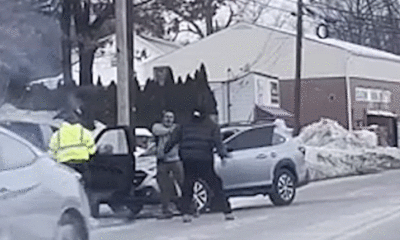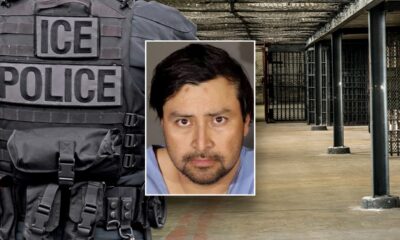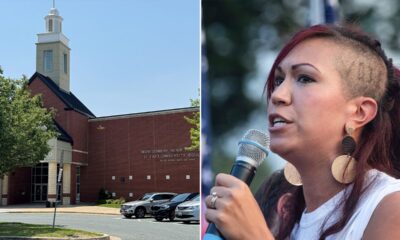World
'Serious politics': Scholz backs government's migration policies

The chancellor stressed that many people from other countries have helped the economy but added that the government must be able to choose who comes to Germany.
German Chancellor Olaf Scholz underlined the public’s wish for “serious politics” rather than “a theatrical performance” after talks about migration with opposition party CDU collapsed on Tuesday.
Addressing the recent success of the anti-immigrant hard-right party Alternative for Germany (AfD) during the two state elections in eastern Germany, Scholz said the AfD is “married to the past” and trying to rob the country of its future.
Although Scholz aggressively defended his coalition government’s policy of welcoming migrants, other EU countries, such as Poland, say that the German government’s decision this week to extend controls to all its land borders undermines Europe’s Schengen zone and could destabilise the EU as a whole.
“There is no country in the world with a shrinking working population that has economic growth. That is the truth we are confronted with,” Scholz said, highlighting pensions as one of the most important future tools for the country’s youth.
Both the far-left and far-right parties have been capitalising on the struggle of many pensioners to cover costs amid a backdrop of soaring living costs, including energy.
AfD leader Alice Weidel spoke directly after Scholz and said he is the “chancellor of decline”.
Pointing at the recent problems at Volkswagen and plans to trim the workforce, she said, “the most famous names are cutting jobs in Germany and relocating abroad because they are no longer competitive here.”

World
Paramount Sends ByteDance Cease-and-Desist Letter Over Seedance AI Videos, Alleging Intellectual Property Infringement

Paramount Skydance accused ByteDance of engaging in “blatant infringement” of its intellectual property with its Seedance video and Seedream image generative AI platforms, alleging the Chinese internet giant is illegally ripping off IP including “South Park,” “Star Trek,” “The Godfather,” “Dora the Explorer” and more.
The media company sent a cease-and-desist letter Saturday to ByteDance, a copy of which was obtained by Variety, demanding it discontinue the alleged infringement. The letter from Gabriel Miller, Paramount Skydance’s head of intellectual property, was addressed to ByteDance CEO Liang Rubo.
That came after Disney sent a cease-and-desist letter Friday to ByteDance asserting the company’s AI platforms are making available “a pirated library of Disney’s copyrighted characters from Star Wars, Marvel, and other Disney franchises, as if Disney’s coveted intellectual property were free public domain clip art.” “ByteDance’s virtual smash-and-grab of Disney’s IP is willful, pervasive, and totally unacceptable,” David Singer, a partner at Jenner & Block, wrote on behalf of Disney.
Seedance is the latest AI video system to set off alarms across Hollywood. After videos generated by ByteDance’s Seedance 2.0 went viral this week — including one of Tom Cruise and Brad Pitt fighting on a rooftop (pictured above) — the Motion Picture Association condemned ByteDance on Thursday, calling on the company to immediately cease its infringing conduct. Actors union SAG-AFTRA and the Human Artistry Campaign, a coalition of artists’ rights groups affiliated with Hollywood unions, also spoke out against the ByteDance AI model.
Paramount’s Miller, in the letter to ByteDance, wrote that “much of the content that the Seed Platforms produce contains vivid depictions of Paramount’s famous and iconic franchises and characters, which are protected under copyright law, trademark law, and the law of unfair competition (among other doctrines).” The content in the AI-generated images and videos produced by ByteDance’s platforms “is often indistinguishable, both visually and audibly,” from Paramount’s copyrighted characters and stories.
Reps for ByteDance did not immediately respond to a request for comment Saturday.
According to Miller’s letter, Paramount properties including “South Park,” “SpongeBob SquarePants,” “Star Trek,” “Teenage Mutant Ninja Turtles,” “The Godfather,” “Dora the Explorer” and “Avatar: The Last Airbender” have “all been repeatedly infringed by the Seed Platforms’ production and subsequent public performance and distribution of these images and videos.” Moreover, with the recent release of the Seedance 2.0 video generation tool, “ByteDance’s infringing activities appear not only to be continuing but becoming more prevalent and the unlawful outputs more widely disseminated,” Miller wrote.
In the letter, Paramount Skydance demanded that “ByteDance immediately take all necessary steps to (i) prevent violations of our intellectual property rights by ensuring that our content is not used or created by ByteDance or the Seed Platforms going forward, and (ii) remove all infringing instances of Paramount’s content from ByteDance’s platforms and systems.”
World
US military in Syria carries out 10 strikes on more than 30 ISIS targets: photos

NEWYou can now listen to Fox News articles!
U.S. Central Command (CENTCOM) announced Saturday that it had carried out ten strikes against over 30 ISIS targets in Syria in recent days as part of a joint military effort to “sustain relentless military pressure on remnants from the terrorist network.”
CENTCOM said, from Feb. 3-12, its forces “struck ISIS infrastructure and weapons storage targets with precision munitions delivered by fixed-wing, rotary-wing, and unmanned aircraft.”
Recently, CENTCOM forces conducted five strikes against an ISIS communication site, critical logistics node and weapons storage facilities in Syria between Jan. 27 and Feb. 2.
US MILITARY IN SYRIA CARRIES OUT 5 STRIKES AGAINST ‘MULTIPLE ISIS TARGETS’
Operation Hawkeye Strike targets over 30 ISIS sites after a December ambush that killed US troops. (CENTCOM)
“Striking these targets demonstrates our continued focus and resolve for preventing an ISIS resurgence in Syria,” Adm. Brad Cooper, the commander of CENTCOM, said in a statement at the time.
“Operating in coordination with coalition and partner forces to ensure the enduring defeat of ISIS makes America, the region and the world safer.”
AFTER TRUMP DECLARED ISIS DEFEATED, US FACES NEW TEST AS DETAINEES MOVE AMID SYRIA POWER SHIFT
On Jan. 27, President Trump told reporters he had a “great conversation with the highly respected” president of Syria, Ahmed al-Sharaa.
More than 50 ISIS terrorists have been killed or captured and over 100 ISIS infrastructure targets have been struck. (CENTCOM)
“All of the things having to do with Syria in that area are working out very, very well,” said President Trump. “So, we are very happy about it.”
The Operation Hawkeye Strike mission was launched in response to an ISIS “ambush” attack that left two U.S. service members and an American interpreter dead Dec. 13, 2025, in Palmyra, Syria.
AFTER TRUMP DECLARED ISIS DEFEATED, US FACES NEW TEST AS DETAINEES MOVE AMID SYRIA POWER SHIFT
“More than 50 ISIS terrorists have been killed or captured and over 100 ISIS infrastructure targets have been struck with hundreds of precision munitions during two months of targeted operations,” CENTCOM said.
The Operation Hawkeye Strike mission was launched in response to an ISIS “ambush” attack that left two U.S. service members and an American interpreter dead. (CENTCOM)
On Thursday, CENTCOM announced it had completed its withdrawal of American forces from al-Tanf Garrison in Syria, pointing to a broader shift in U.S. posture in the region.
CHAOS IN SYRIA SPARKS FEARS OF ISIS PRISON BREAKS AS US RUSHES DETAINEES TO IRAQ
“Striking these targets demonstrates our continued focus and resolve for preventing an ISIS resurgence in Syria,” said Adm. Brad Cooper. (CENTCOM)
Operation Inherent Resolve was launched in 2014 to combat ISIS with American troops maintaining a limited presence to support partner forces and prevent ISIS from returning after it was territorially defeated in 2019.
CLICK HERE TO DOWNLOAD THE FOX NEWS APP
Fox News Digital’s Ashley Carnahan and Greg Norman-Diamond contributed to this report.
World
A pardon for a price? How Donald Trump has reimagined presidential clemency

Limits to pardon powers
But there are limits to presidential clemency, and already, Trump has brushed against them.
In December, Trump announced that he would pardon Tina Peters, a former county clerk in Colorado who supported Trump’s false claims of voter fraud during the 2020 election.
Peters, however, was also convicted of state-level crimes, after she used her office to allow an unauthorised person to access her county’s election software.
A president may only pardon federal charges, not state ones. Peters continues to serve a nine-year prison sentence. Still, Trump has sought to pressure Colorado officials to release her.
“She did nothing wrong,” Trump posted on Truth Social. “If she is not released, I am going to take harsh measures!!!”
While Trump has argued that presidents have the “complete power to pardon”, legal experts have repeatedly affirmed that clemency is not without bounds.
Pardons, for example, cannot be used to avoid impeachment or to undercut the Constitution, nor can they be used to absolve future crimes.
Still, the question remains how to enforce those limits — and whether new bulwarks should be created to prevent abuse.
Love points to the state pardon systems as models to emulate. Delaware, for example, has a Board of Pardons that hears petitions in public meetings and makes recommendations to the governor. More than half of the petitions are granted.
Like other successful clemency systems, Love said it offers public accountability.
She measures that accountability by certain standards: “Can people see what’s going on? Do they know what the standards are, and is the decider a respected and responsible decision-maker?”
Trump’s sweeping actions, however, have prompted calls for presidential pardons to be limited or eliminated altogether.
Osler cautions against doing so: It would be a “permanent solution to a temporary problem”.
“If we constrain clemency, we’ll lose all the good things that come from it,” Osler said.
-

 Politics1 week ago
Politics1 week agoWhite House says murder rate plummeted to lowest level since 1900 under Trump administration
-

 Alabama1 week ago
Alabama1 week agoGeneva’s Kiera Howell, 16, auditions for ‘American Idol’ season 24
-

 Culture1 week ago
Culture1 week agoVideo: Farewell, Pocket Books
-

 Science1 week ago
Science1 week agoVideo: Rare Giant Phantom Jelly Spotted in Deep Waters Near Argentina
-

 News1 week ago
News1 week agoVideo: Investigators Say Doorbell Camera Was Disconnected Before Nancy Guthrie’s Kidnapping
-

 Technology1 week ago
Technology1 week agoApple might let you use ChatGPT from CarPlay
-

 Illinois6 days ago
Illinois6 days ago2026 IHSA Illinois Wrestling State Finals Schedule And Brackets – FloWrestling
-

 Technology1 week ago
Technology1 week agoRepublicans attack ‘woke’ Netflix — and ignore YouTube





















